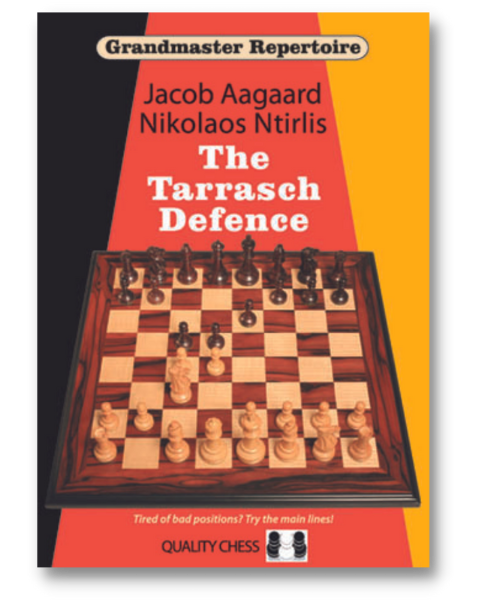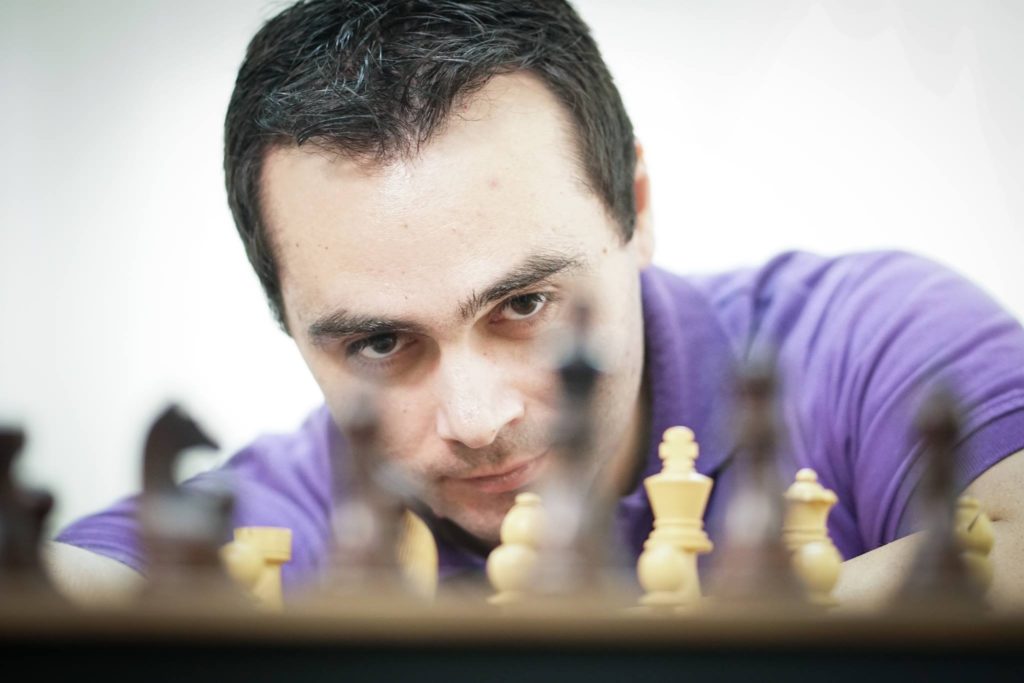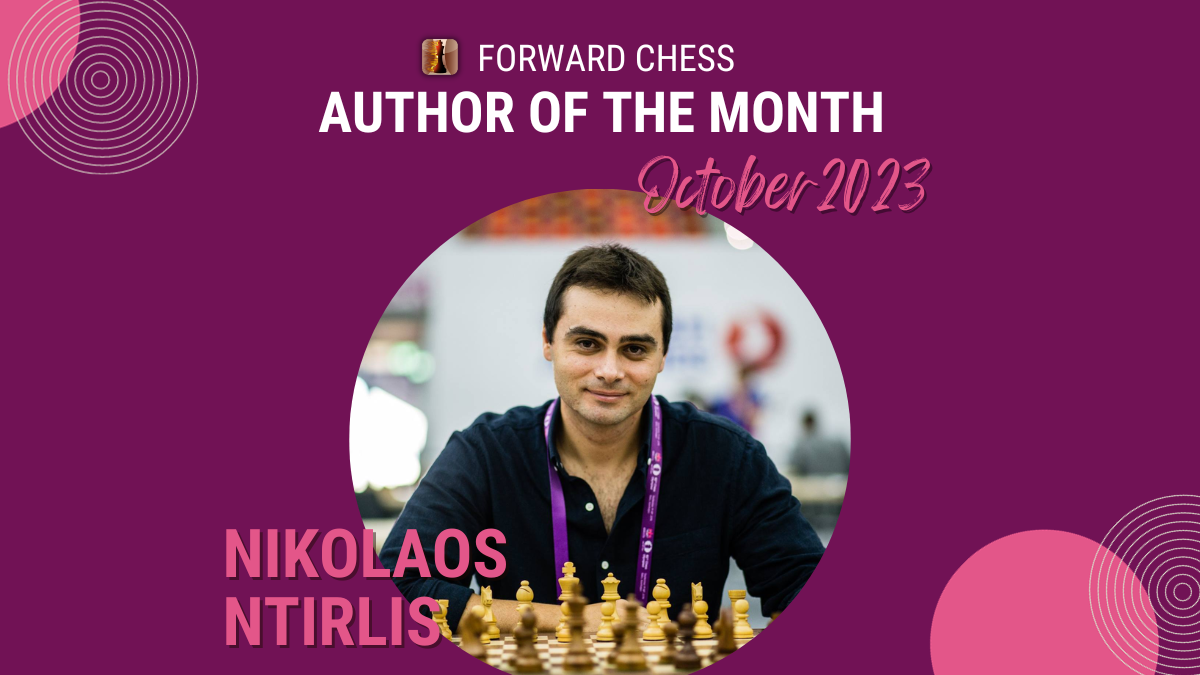Get to know our Forward Chess author of the month for October 2023, Nikolaos Ntirlis.
Tell us a little bit about yourself and your chess career
I learned chess in my 20s! That’s really late if someone wants to become a strong chess player. Also, at that point, I had a very demanding university school and I had to work to make a living. So, naturally, it wasn’t possible for me to dedicate a lot of my time to chess.
In a way, I was back then what today is known as an “adult chess improver”. Today, there is an awesome internet community for these improvers, and a lot of resources to help them, but back in the start of the 00s, the possibilities were far more limited.
Still, I was lucky to have met great people who became longtime friends and helped me improve by playing local friendly games and analyzing my tournament games. I soon reached 1900 FIDE. Something not incredible of course, but I still feel proud I was able to achieve it.
I soon discovered that what really fascinated me, was the interconnection between computer science (the topic I was studying on) and chess. So, I decided to spend more time understanding chess engines and even programming my own chess apps.
Around 2011, I became a correspondence player. A natural evolution for people who are fascinated by computer chess. I managed to become an ICCF IM. I currently play at the finals of the European Championship and the semi-finals of the World Championship.
With the rise of new chess engines, it has become nearly impossible to win correspondence games, but I’ll still ask you to cross your fingers for me to get one of these two titles.
A computer chess geek spends a lot of time analyzing chess openings. So, this became my area of expertise. I was soon approached by GMs and other ambitious players who realized that someone with my skill set could help them get an edge in their opening play.
And that’s where my chess career has been more successful. Helping GMs and other ambitious titled players win national championships, norms or play in important tournaments like Olympiads, top tournaments and World Championships.
What is your favorite chess game that you’ve played?
I still remember this game that I played after about a year that I started playing chess. Unfortunately, I have lost the name of my opponent. I remember that it was a 1300 FIDE-rated young player. I was so enthusiastic about this game that what mattered to me was how I played in the following position:
That’s not my best game, or my best result, but I don’t think that any other game will beat this one in my mind. It is my favorite game!
What is your favorite chess opening?
The Spanish Opening (or the Ruy Lopez). It arises after 1. e4 e5 2. Nf3 Nc6 3. Bb5. It has a remarkable history. All the World Champions have played it for both colors and it is still an incredibly rich opening to study for both colors.
What inspired you to write chess books?
This happened due to tragic incident.
In 2009, my coach (who was also a best friend) and I, FM Nikos Karapanos were planning to create a chess school. I was responsible for the openings we would teach to the young students of the school.
FM Karapanos, had already many successful students in many cities in Greece. One of his biggest successes was coaching a school from a small Greek city (Amfissa, with a population of a bit more than 6,000) to end up 3rd in the team school championships. This was considered an impossible feat at that time.
Unfortunately, my coach died during a chess game. And his death was also dramatic. He was playing this position against the now GM Dan Zoler from Israel:
Zoler’s last move was 36…Nc5. He was essentially waiting to resign, after the obvious 37.Rxf7+
Karapanos had played an incredible game, true to his attacking style, sacrificing a queen for the attack. He now had 2 minutes on the clock and was walking around the playing hall, feeling certain that he will soon finish the game. He saw his opponent’s move. He came on the board. He had two minutes on his clock. More than enough time of course, as he already knew what was his threat.
But, this is when something weird happened. He wasn’t making a move. Half a minute passed. Then a minute… His opponent, a doctor, realized that something was wrong with his opponent. Karapanos soon fell from his chair, suffering a heart attack. He received immediate help from his opponent and was transferred to the hospital within minutes of the incident.
Alas, he didn’t make it… He was 42 years old.
This was a shock for me. I tried to keep his memory alive by attempting to publish the work we had done together on one of his favorite openings, the Tarrasch Defence. An opening that the great Efim Geller had taught to him when Karapanos was a junior, as Geller served for a brief period as the coach of the Greek national team.
There was one publication house that got excited to publish my work. Quality Chess, with Jacob Aagaard as a co-author. I am fortunate to have Jacob believe in me back then. This was the start of a life-long friendship with Jacob.

By the way, a bit before Karapanos left to play in the tournament where he played his last game, he told me that he was certain that one day I’d surpass his coaching achievements.
In 2017, I helped Sabina Foisor to win the US Women’s championship and I helped the school from the small city of Poligiros (population of 10,000) to win second place in the Greek school team championships.
It was only then, that I felt that I fulfilled Karapanos’ prophecy.
Rest in peace my friend. I owe you everything.
At Forward Chess, we have your books; Playing 1.d4 d5, A Classical Repertoire, Playing 1.e4 e5 – A Classical Repertoire, Playing the English, Playing the French, and The Tarrasch Defence. You have told us about Playing the English, can you briefly tell us about the other books?
I already told you the origin story of my first book, on the Tarrasch Defence which was published in 2011.
Not long after that, I started working as a coach for the National team of Denmark. My work on the French and on 1.e4 e5, was based on the work that I did for a number of GMs. They are essentially my co-authors, as they were constantly testing my lines and offered me feedback.
My 1.d4 d5 book was meant to be a companion volume for the extremely successful 1.e4 e5 book. This was the first book where I started offering more strategic explanations in the chapters before the theory was presented. The readers loved the book and loved the introductory chapters. So, my publication house, Quality Chess, asked me to do the same for the book for White this time. You may have read the rest of the story here.

Since you have written so many successful opening books, what advice do you have with regard to learning a new opening?
Work on the lines on your own. Don’t trust the author. Build your own files, think critically, test and re-work your lines. An opening book is just a starting point for a journey of learning a new opening.
Do you have a favorite chess book or do you have a must-read book list that you would recommend?
My favorite book is “Learn for the Legends” by Mihail Marin. I am always fascinated by books that cover the history of the game. The great players and what they tought to us. Books like Kasparov’s “My Great Predecessors” and Karoliy’s books on Karpov, Tal and Fischer are my favorite types of books.
I believe that (and I am not the only one who shares this opinion) the best chess books of all time, are Aagaard’s series on “Grandmaster Preparation” (Calculation, Positional Play, Strategic Play, Attack and Defence and Thinking Inside the Box). Jacob managed to beat the legendary series of Dvoretsky’s books on the most important and essential books a serious chess player needs to work on. I hope Jacob will surpass these books with his new series, which I think is called “A Matter of Technique” or something like that.
Jacob is my good friend and I am biased, but I also think that I am fair. If you are serious about your game, go get these books and start working on them. It is what modern chess is about.
What do you think about Forward Chess?
I am happy to have known Forward Chess since its first beginning! I actually worked on a few of the books that they published. So, I love Forward Chess and I am also biased. I can only say good things about this company.
I think that you are playing an important role in making chess accessible to more people worldwide. And I love that you now enrich your content with diverse topics, videos, articles, reviews etc.
I would love to see Quality Chess and Forward Chess dominate the chess world. As I said, I am biased, but you asked my opinion. So, here you go!

Nikolaos (aka “Nikos”) Ntirlis is a chess coach and an award-winning author. He has been working with top-level players since 2004 and has written five books and many articles on chess openings. He is an International Master in correspondence chess and is currently playing in the European and World Championships finals. He is active on Twitter, where he posts instructive and fresh chess ideas. Nikos is also a Revenue Operations Manager at Databox, a business analytics app. His motto: “Inform all your decisions based on data” reflects his approach to both his work in business and his chess. Follow him on Twitter and LinkedIn to learn more about his chess and business insights.
- 1000 Published books on Forward Chess - November 15, 2024
- Book Review: A Guide To Chess Improvement - September 9, 2024
- Review: Chess Coach by Vladimir Barsky - August 26, 2024
